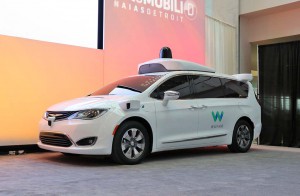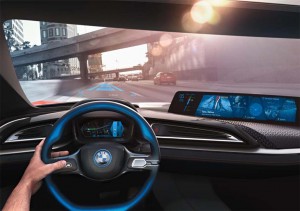
Fiat Chrysler's Sergio Marchionne said the partnership with Waymo that produced the autonomous Chrysler Pacifica wouldn't be monogamous.
When Fiat Chrysler Automobiles linked up with Google spinoff Waymo last year, CEO Sergio Marchionne hinted it wasn’t going to be a monogamous relationship – and he wasn’t kidding. FCA today announced it will also pair up with erstwhile rival BMW, as well as tech firms Intel and Mobileye to work together on the development of autonomous vehicles.
The announcement is the latest in a series of high-tech tie-ups linking traditionally competing carmakers, as well as a mix of tech giants and ambitious start-ups. Just last week, for example, Intel entered a new alliance with Toyota, dubbed the Automotive Edge Computing Consortium, which is aimed at driving more data into and out of tomorrow’s smart and autonomous vehicles.
“In order to advance autonomous driving technology, it is vital to form partnerships among automakers, technology providers and suppliers,” said FCA Chief Marchionne. “Joining this cooperation will enable FCA to directly benefit from the synergies and economies of scale that are possible when companies come together with a common vision and objective.”
(Toyota, Intel form “big data” consortium. Click Here to learn what that’s all about.)
Virtually every automaker now has some sort of self-driving vehicle program underway. It’s costly, and can strain a corporate budget when added on top of efforts at electrification and other future developments. FCA has been especially hard-pressed to keep up, one reason Marchionne has openly said he would like to find a new automotive alliance partner, perhaps even find a buyer for the company.
The automaker has been slower than key rivals in terms of both its electrification and autonomous vehicle efforts. But it got a big boost when Waymo decided to purchase 100 Chrysler Pacific Hybrid minivans last year – adding another 100 to that order in January. They’re now beginning to go into service in the Phoenix area as part of a pilot autonomous ride-sharing program Waymo has launched.
(Click Here for more on that autonomous ride-sharing program.)
It is unclear if that alliance will go any further – especially with the formation of the new FCA-BMW partnership. The goal is to share development efforts to reduce costs, and eventually come up with different levels of autonomous capabilities. That includes:
- What is known as Level 3 autonomy, where a vehicle is able to operate under specific conditions, such as limited-access highways, hands-free. But an “operator” must always be sitting behind the wheel ready to take control quickly, if necessary;
- Level 4 vehicles will truly operate hands-free, but in defined areas and conditions. That might limit the use to freeways or certain local roads and only under good weather conditions;
- Level 5 vehicles will be able to operate hands-free under all circumstances and in all locations and may not even have driver controls.
“The two factors that remain key to the success of the cooperation are uncompromising excellence in development, and the scalability of our autonomous driving platform,” said BMW Chairman Harald Krüger. “With FCA as our new partner, we reinforce our path to successfully create the most relevant state-of-the-art, cross-OEM Level 3-5 solution on a global scale.”
Specifics of the relationship have yet to be revealed. In some alliances like this one, however, manufacturers often work together on preliminary development then split off to give their technology unique features and attributes.
The presence of Intel means that FCA and BMW will have ready access to some of the world’s most advanced microprocessing technology. Intel itself has been pushing hard to become a major player in the autonomous vehicle field, seeing that as an area of significant growth. By some industry estimates, the majority of vehicles will offer some level of self-driving capabilities by the end of the next decade.
As for Mobileye, it is a leader in onboard vision systems. Its camera-on-a-chip technology is now used by the vast majority of the world’s automakers – though Mobileye and Tesla recently had a falling out over the battery-carmaker’s Autopilot system. Intel purchased the Israeli-based firm in May of this year for just over $15 billion.
As with the FCA-Waymo deal, the new partners aren’t expecting to be monogamous with one another. In the race to develop tomorrow’s high-tech autos, there are getting to be plenty of strange bedfellows.
(For more on the possibility of an FCA-China deal, Click Here.)
Meanwhile, FCA itself could see some big changes in the near future. While Marchionne’s bid for an automotive alliance partner has been turned down by such players as General Motors and Volkswagen, reports this week indicated the company was given an offer from a Chinese company – believed to be Great Wall Motors, that country’s largest SUV and pickup manufacturer. It appears the bid was rejected by FCA, but industry analysts say it may be just a matter of time before Great Wall or another Chinese carmaker comes back with a more acceptable deal.

